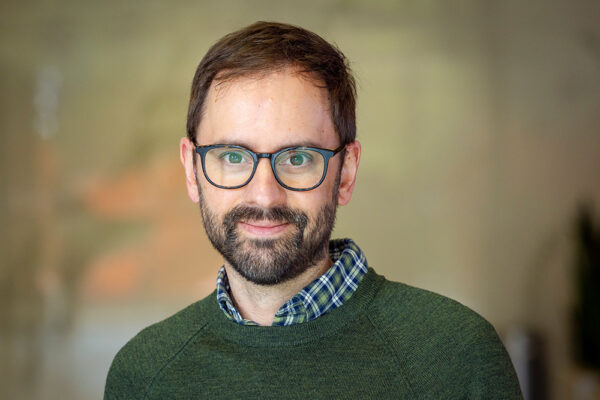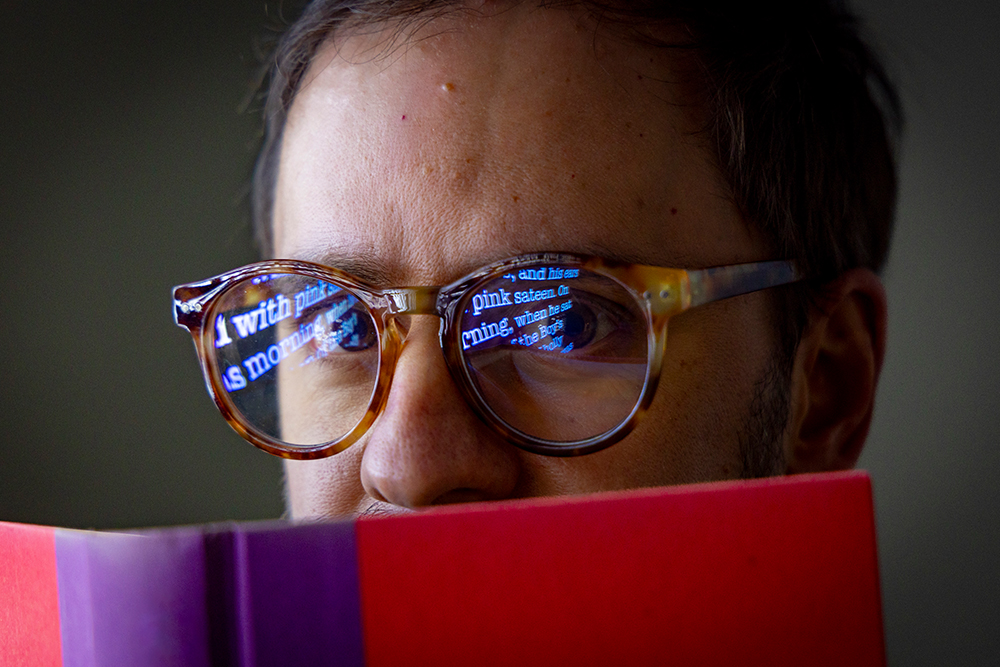Listen to this story below:
When Christian Ehret was 5 years old, his parents would place a stack of books next to his bed for him to read before falling asleep each night. In middle school, “The Old Man and the Sea” by Ernest Hemingway became his favorite. He’s always been drawn to books about nature that involve adventure and perseverance.
So, it’s no surprise that his career landed him in the world of literacy as an associate professor within the UNC School of Education.
As the world has become more digitized, children are experiencing literacy in ways previous generations never did. YouTube videos, Instagram reels, video games, and other media are replacing dictionaries, textbooks, and written letters.
Digital opportunities have opened doors for people to learn about whatever topics they’re interested in — but have revealed unexpected repercussions, such as a loss of face-to-face interactions and an increase in misinformation.
The word “literacy” generally refers to reading and writing skills, but when you tack on the word “digital” to it, the term encompasses so much more.
The American Library Association’s Digital Literacy Task Force offers this definition: “Digital literacy is the ability to use information and communication technologies to find, evaluate, create, and share information, requiring both cognitive and technical skills.”
In the ever-changing digital literacy landscape, Ehret analyzes the emotional dimensions of how people engage digitally to communicate, create, and connect. Specifically, he focuses on how technology enhances community, deepens children’s identity, and affects their well-being.
“My research is centered around not just how kids are using digital media, but also how we can make educational experiences better — not just in school but in other contexts where kids are learning that you don’t normally think of,” Ehret says.
Pedagogical pursuits
Although Ehret was interested in books from an early age, he didn’t always know he wanted to teach. Growing up in Savannah, Georgia, he didn’t have to travel far to follow his educational aspirations at the University of Georgia (UGA), where he received his bachelor’s and master’s degrees.
Ehret taught classes at UGA while completing his comparative literature graduate coursework and writing a thesis on Herman Melville’s poetry. He often found himself in the library, exploring his assignments alone and in silence. It was during this time that he realized that he didn’t want a future of isolation, but instead to be around people and continue teaching.
Even though he had already completed all his comparative literature degree coursework, he switched into the English education master’s program, graduating in 2006.

Christian Ehret (photo by Megan Mendenhall)
That same year, Ehret became a high school English teacher in Athens, Georgia, teaching all academic levels.
He let his students create their own blogs to help them learn about web design and writing. But they learned so much more. He watched their creativity evolve as they personalized their sites and their relationships grow as they interacted with one another in new ways.
“What a lot of what people are doing online is very different now,” he says. “There’s some commonalities, but back then it was really important to identity development.”
For a different project on “All the Pretty Horses” by Cormac McCarthy, he tasked them with an interpretation analysis of the novel in any format they wanted. One student created theirs using the online game “World of Warcraft.”
Ehret will always credit his teaching experiences for inspiring his research. In 2009, he decided to pursue a PhD in Learning, Teaching, and Diversity from Vanderbilt University.
“I realized that I kept seeing how digital media meant something to teenagers in their everyday lives,” Ehret says. “It can be used to make them known differently to us as teachers in terms of their knowledge and ability. That drove me to want to understand more.”
Connecting pediatric patients
While working on his PhD, Ehret spent three years in Nashville, Tennessee, developing a research project on teaching and interacting with long-term patients in children’s hospitals schools. To help bring a sense of normalcy to these students, Ehret taught the typical literacy lessons, but also customized each patient’s education for their situation.
He wanted to better understand what they were already doing themselves in the hospital to learn, stay connected to friends and family, and foster a sense of hope and community. Then, he could use that knowledge to inform a more youth-centered design process for his research.
Ehret involved multiple practitioners, such as hospital teachers, health care teams, and play therapists, to ensure these programs could be sustained over time and positively impact patients.
Teens with cystic fibrosis (CF) could learn more about their condition by creating their own YouTube videos on a shared channel. Or they could interact with other kids their age through game servers like Minecraft, since people with CF must limit their in-person contact with other CF patients to reduce exposure to germs and bacteria.
Additionally, the hospital school provided young patients the resources to produce videos about their interests, which helped them form a stronger bond with others and learn important skills like media production.
“When you’re feeling alone in a moment of uncertainty, doing something right and creating something therapeutic is what keeps us going,” Ehret says. “Finding humanity in that space is important and as kids talk about their creation, it connects them with other kids in that virtual space.”
Exploring esports education
Before coming to Carolina in August 2023, Ehret was a professor at McGill University in Canada. During his time there, he focused on creating competitive video gaming teams to teach youth how to learn and coordinate in the esports arena. For this work, he partnered with urban community centers in Montreal, focusing on those serving socially and financially marginalized communities.
The city is also where Ubisoft, a video game publisher known for games like “Assassin’s Creed” and “Just Dance,” has one of their largest headquarters.
Using the same design-based methods as his hospital school research, Ehret brought in Ubisoft employees to not only help the young gamers interact with each other digitally, but to learn from them.
The seven-year project was recently re-funded, and Ehret hopes to dig even deeper into the emotional components of esports and digital literacy.
“We’ve tried to focus youth on learning what to do with their energy to help them reflect not just on social development and team development, but also on moments outside of gaming,” Ehret says.
Now in Chapel Hill, Ehret hopes to continue these research projects while writing about new and interesting topics. In October 2023, he published a research article about #BookTok — a trend where creators recommend, review, and discuss books for readers by making engaging videos about them — and how these algorithm-driven social media platforms impact digital literacy.
Whether working with youth in the hospital or students in Carolina classrooms, he wants his teaching and research to inspire hope in the world to come.
“I think the most important thing is that digital literacy has made me the kind of researcher who doesn’t do research on people but does research with people,” Ehret says.


